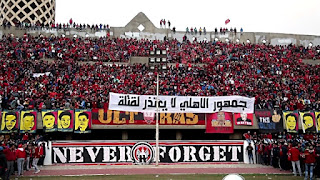
UKW issued a statement proclaiming fear of state-orgnaised violence, while the Ultras Ahlawy confirm plan to attend
The Ultras White Knights (UWK) cancelled their plans to attend the African Cup of Nations match on Saturday evening.
In a statement issued on their Facebook page, the group cited fears of an “uneven battle” between the Ultras group and security forces. They feared a repetition of the events of the “Air Defence Massacre” in which 20 Al-Zamalek fans lost their lives.
On 8 February 2015, an Egyptian premier league football match between Al-Zamalek SC and ENPPI took a violent turn as fans were attempting to enter the Air Defence Stadium. Many were killed when security forces violently dispersed fans crowding the entrance to the stadium. Fans were trapped inside a metal walkway leading into the stadium.
Ultras Ahlawy and UKW), the militant groups supporting Al-Ahly SC and Al-Zamalek SC respectively, issued separate statements Friday morning stating their intentions to attend their respective matches. At the time of publication, the Ultras Ahlawy plan to uphold their intention of attending.
Continue reading “Ultras White Knights cancel plans to attend match”

 Von
Von 

